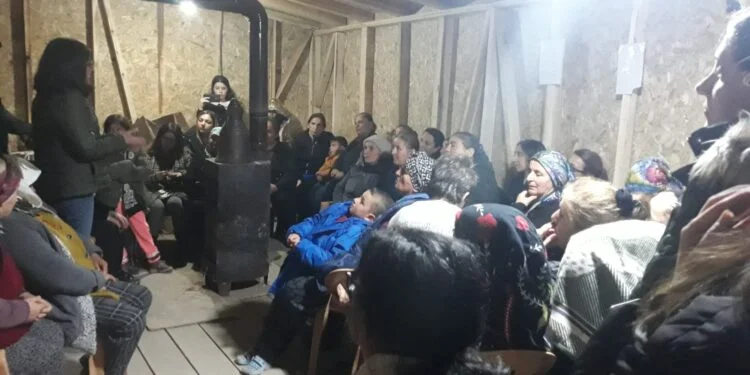https://redherald.org/2023/03/23/overview-of-the-8th-of-march-2023/
We received a lot of request to publish a review of this years 8th of March. We hope to fulfill this solicitation even though we are quite late and this report will certainly not be anywhere near complete.
Austria
Several women’s organizations and initiatives hold a rally in Vienna to mark International Women’s Struggle Day, the Austrian website Rote Fahne reported. It was highlighted that the situation of women is worsening as the crisis worsens: women are particularly affected by indirect wage cuts due to inflation.
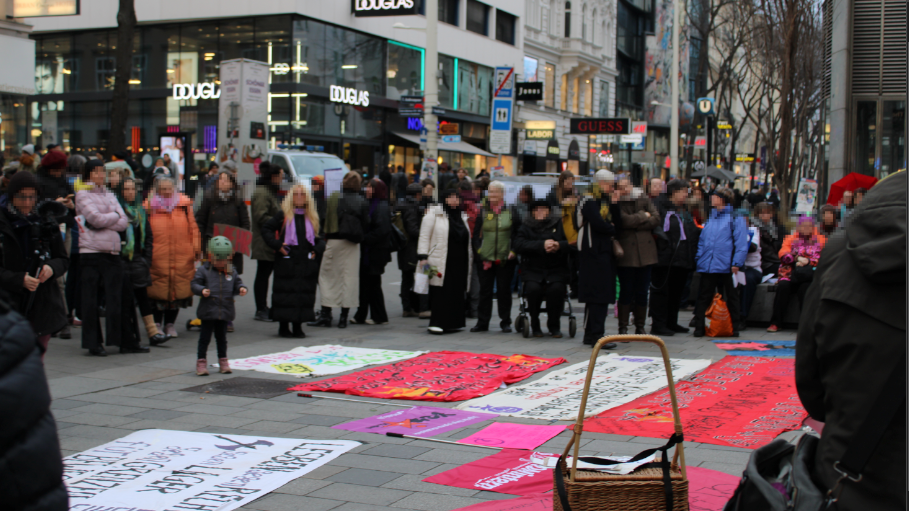
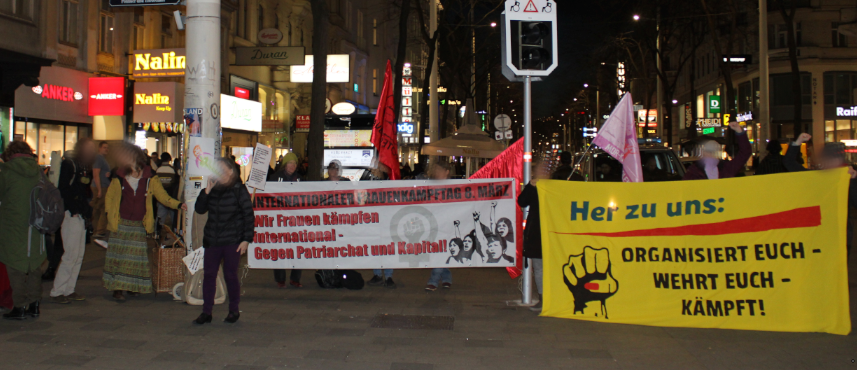
In Linz, the demonstration was attended by around 1,300 people. Demands aimed primarily at the needs and interests of women were shouted above all by a block that stood out with a combative attitude and signs. It was said, that the oppression of women is not a legal question, but a question of class struggle.
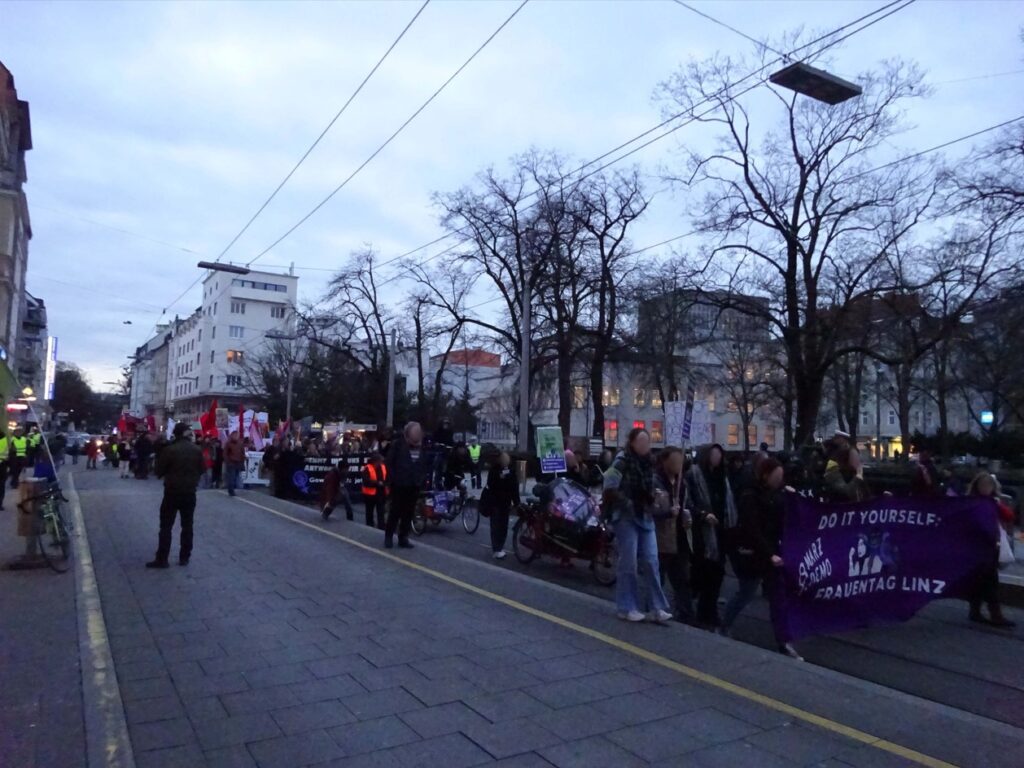
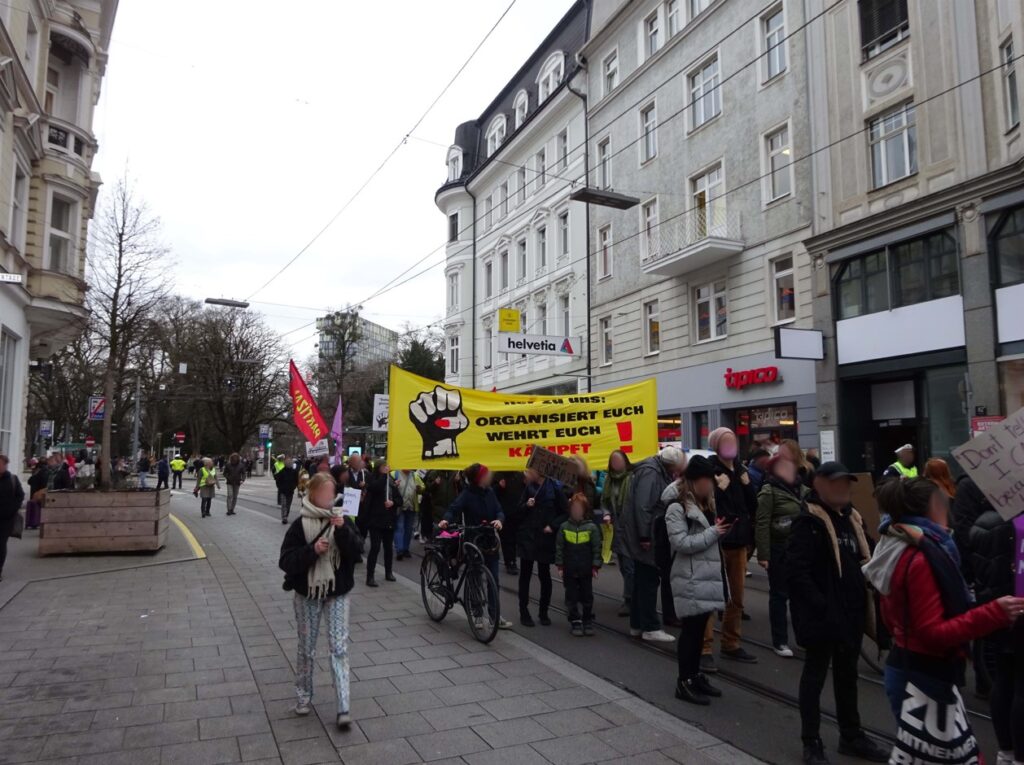
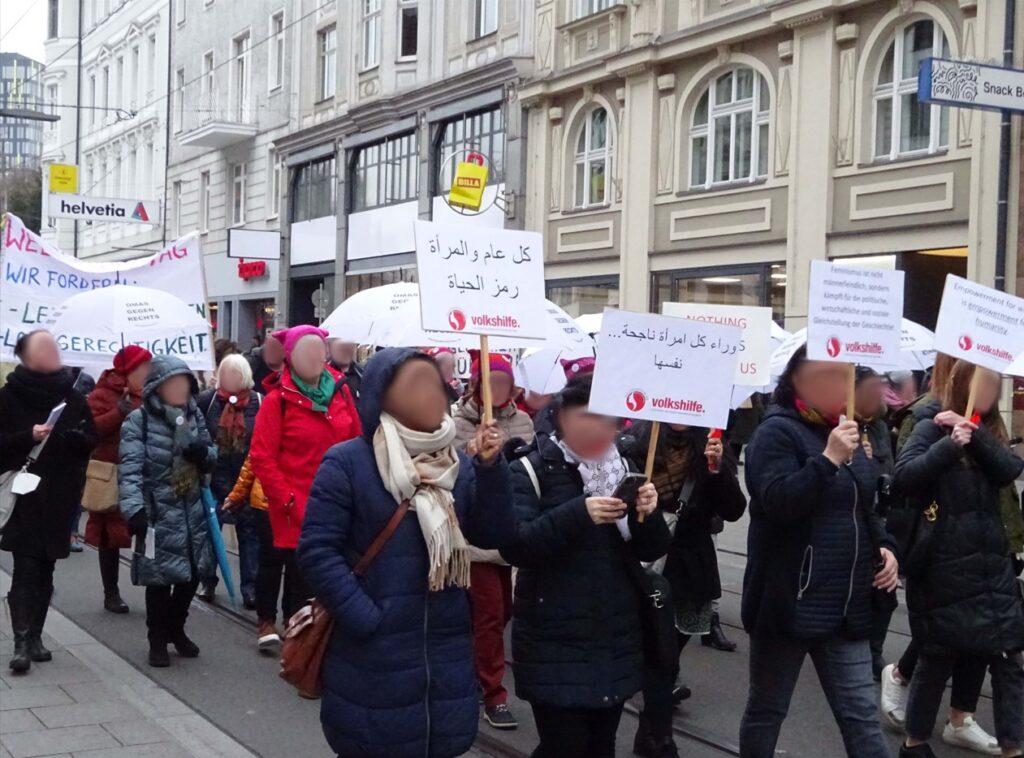
Thousands of people attended the March 8 International Working Women’s Day organized by the Innsbruck Women’s Network and democratic women’s organizations. The Turkish Mor Kızıl Kolektif (Purple Red Collective) took part in different kind of activities, Yeni Demokrasi (New Democracy) reported.
Belgium
Yeni Demokrasi (New Democracy) reported on activites in two cities in Belgium:
In Liège, hundreds of women gathered at the Place Cathédrale square upon the call made by the Collectives et Ardentes – Liège Platform, which includes the Purple-Red Collective, indigenous and migrant organizations.
In Brussels, stands and a stage were set up at the central train station square at 15.00 and speeches were made. Thousands of women participated in the march that started at 18.00. Purple-Red Collective activists also participated in the march and leaflets were distributed in French.
Brazil
The newspaper A Nova Democracia reported that thousands of peasant women mobilized in the struggle for land throughout Brazil between March 1st and 8th, International Proletarian Women’s Day. The struggles, in the form of land seizures and demonstrations, took place in Bahia, Alagoas and Rio Grande do Sul.
In Bahia 470 peasant women have participated in the seizure of three large estates as part of the National Day of Struggle of Landless Women, organized by the Landless Rural Workers Movement (MST). In the early morning of March 1st, around 120 peasant women occupied the Fazenda Santa Maria, in the municipality of Itaberaba, in the Chapada Diamantina region of Bahia. On March 5th, hundreds of peasant women occupied two abandoned farms in the same region. Around 100 peasant women occupied the Rosarinho Farm, in Rafael Jambeiro municipality. Another occupation took place in the northeast region of the state, in the municipality of Jeremoabo, where 200 women occupied the Espinheiro farm.
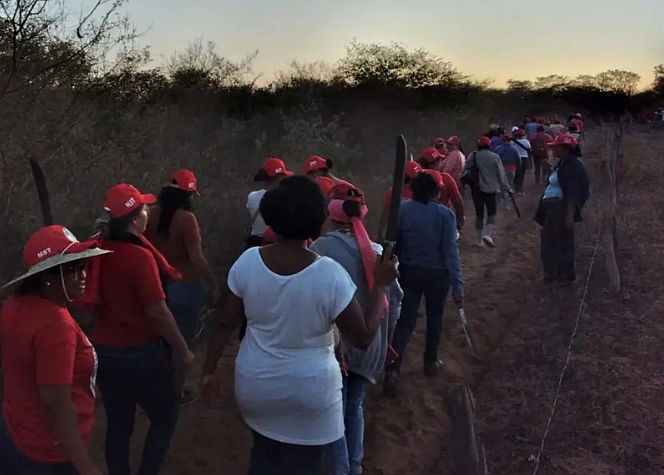
In Alagoas, around a thousand women peasants marched in Maceió, on March 7th, towards the superintendence of the National Institute of Colonization and Agrarian Reform (INCRA), in the center of the capital. The peasant women demanded the Institute to regularize their lands immediately. The march gathered peasants organized in several land struggle movements, such as the Pastoral Land Commission (CPT), the National Struggle Front (FNL), the Landless Liberation Movement (MLST), the Land Struggle Movement (MLT), the Peasant Women’s Movement (MMC), the MST, the Land, Work and Freedom Movement (MTL) and the Free Land Movement.
In Rio Grande do Sul, around 300 peasant women held an act in the community Vila Herdeiros, in Lomba do Pinheiro neighborhood, in front of Lomba do Sabão Dam, on the border between Porto Alegre and Viamão, in Rio Grande do Sul. According to the peasant women, the site, abandoned since 2000, is at high risk of collapse. Also at the demonstration, tributes were paid to Débora Moraes, a militant of the Movement of Dam-Affected People (MAB) who lived in the area and was murdered by her husband in September 2022.
Confronting both the latifundium and its gunmen, the government and its demagogy, the masses of peasants point to the path of taking over the lands of the latifundium.
Chile
Prensa Chiripilko (Chiripilko Press) published a leaflet on the history of 8th of March:
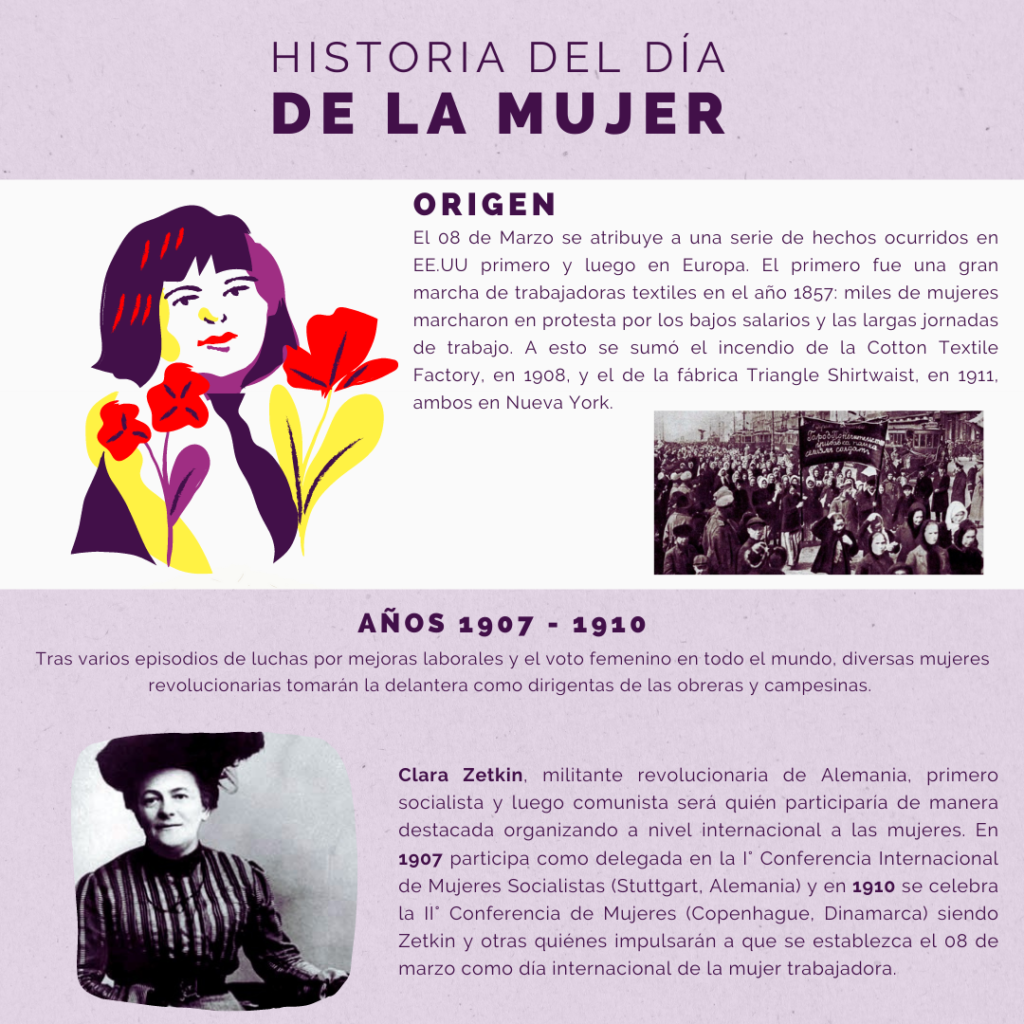
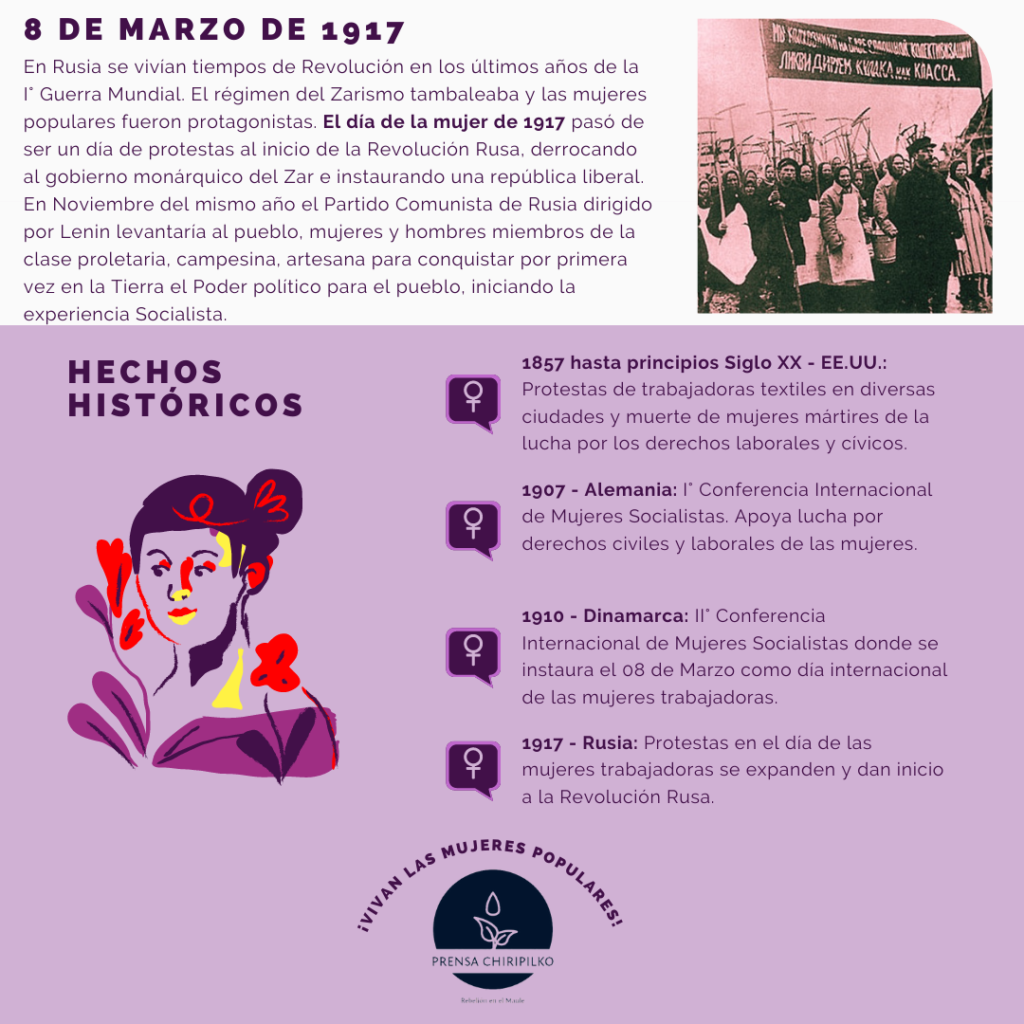
Ecuador
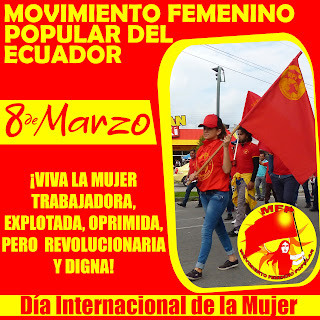
The Front for the Defense of the People’s Struggle published a document of the People’s Women Movement. It states that in the struggle for emancipation, many women assume their responsibilities in the face of the revolution with objectivity and maturity, they give everything, even their lives. It saluted those who have assumed for themselves the responsibility of carrying on their shoulders the other half of the heaven, to bury all vestiges of the old society and build the New Democracy, uninterrupted transited into socialism.
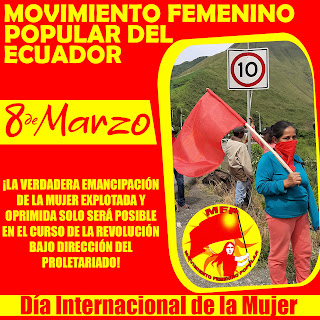
Finland
In Tampere, approaching international women’s day, there were graffiti actions done, Punalippu (the red flag) reported. At a broad demonstration, revolutionaries held high the banner and shout “forward towards a revolutionary women’s movement!”, and spread the joint declaration of Nordic revolutionary movements (of the Anti-imperialist League (Finland), Anti-imperialist Collective (Denmark) and Struggle Committee (Norway)).
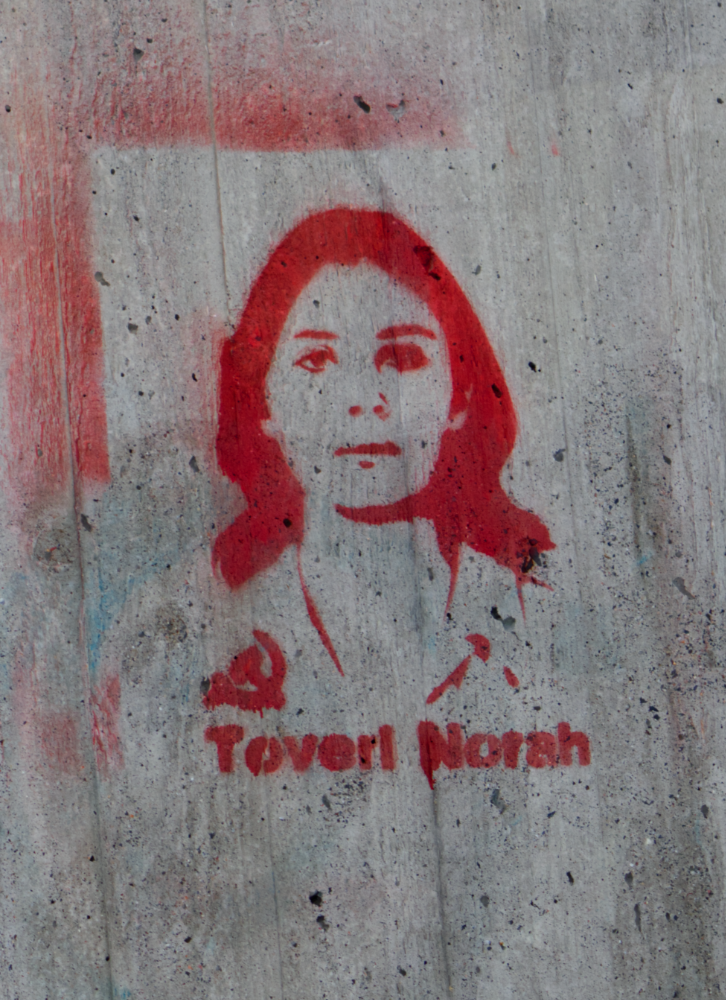
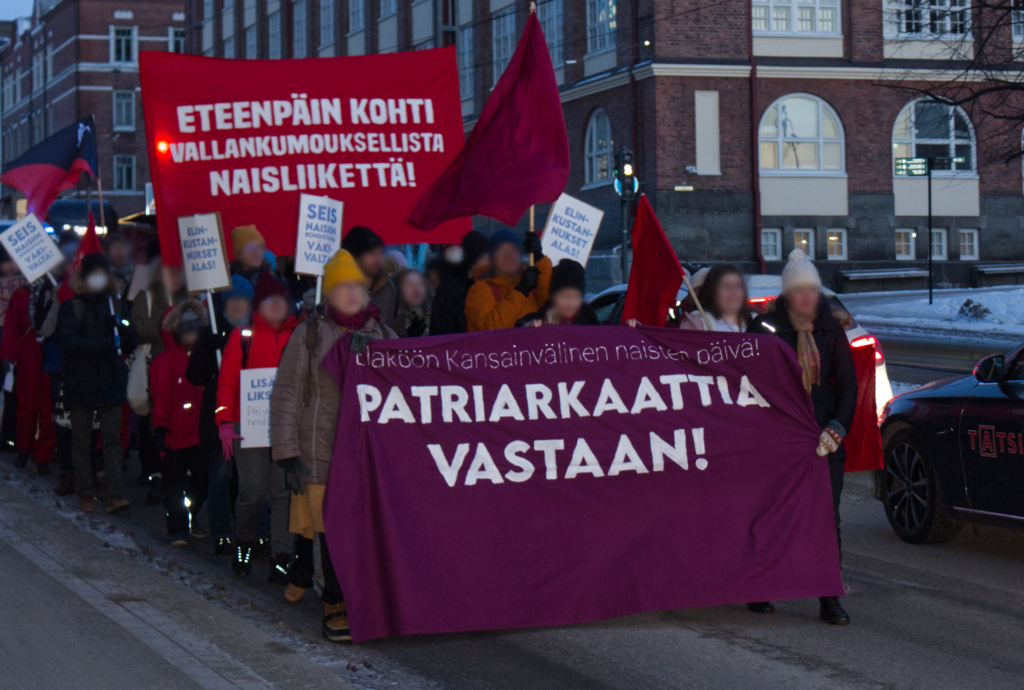
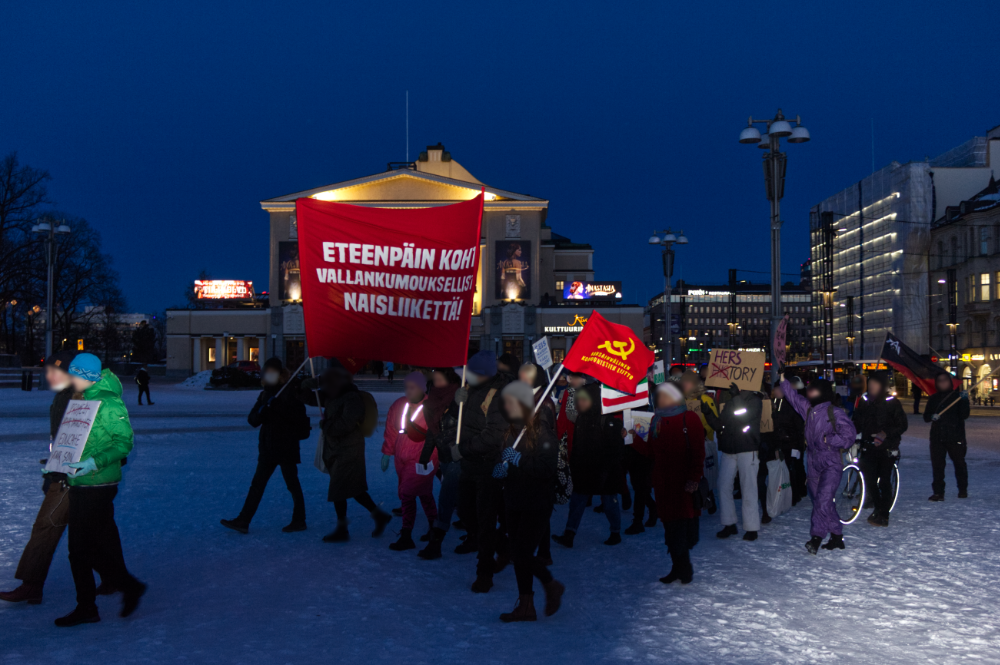
More than a hundred people participated into a demonstration in Helsinki. A small Marxist contingent participated in the demonstration with a banner “Down with imperialism! Down with patriarchy! Proletarian feminism for Communism!” and a placat “¡Honor y gloria a la camarada Norah!”. Also the joint declaration was distributed as a leaflet and was received positively by the masses.
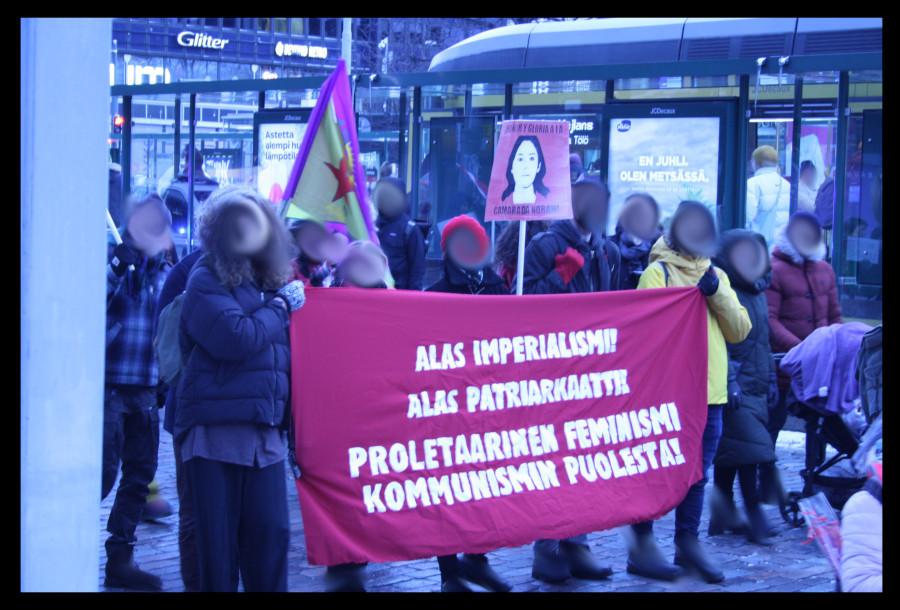
France
In Lyon dazibaos were put up and a demonstration was held by the People’s Womens Committee, the Ligue de la Jeunesse Révolutionnaire (League of Revolutionary Youth) reported.
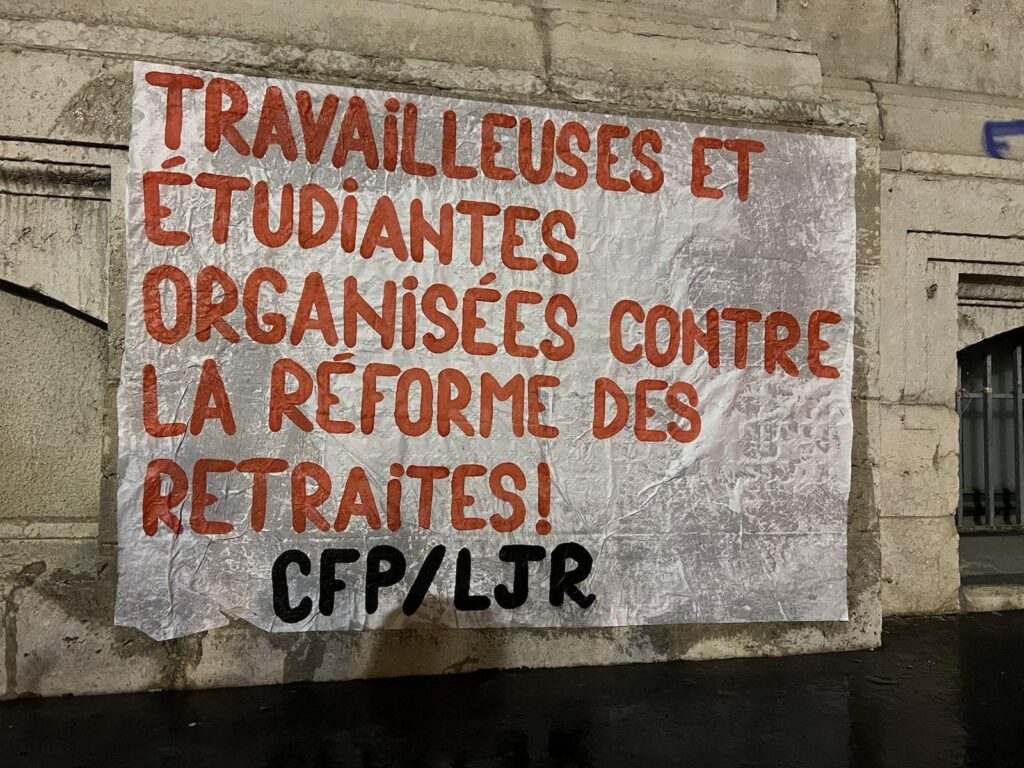
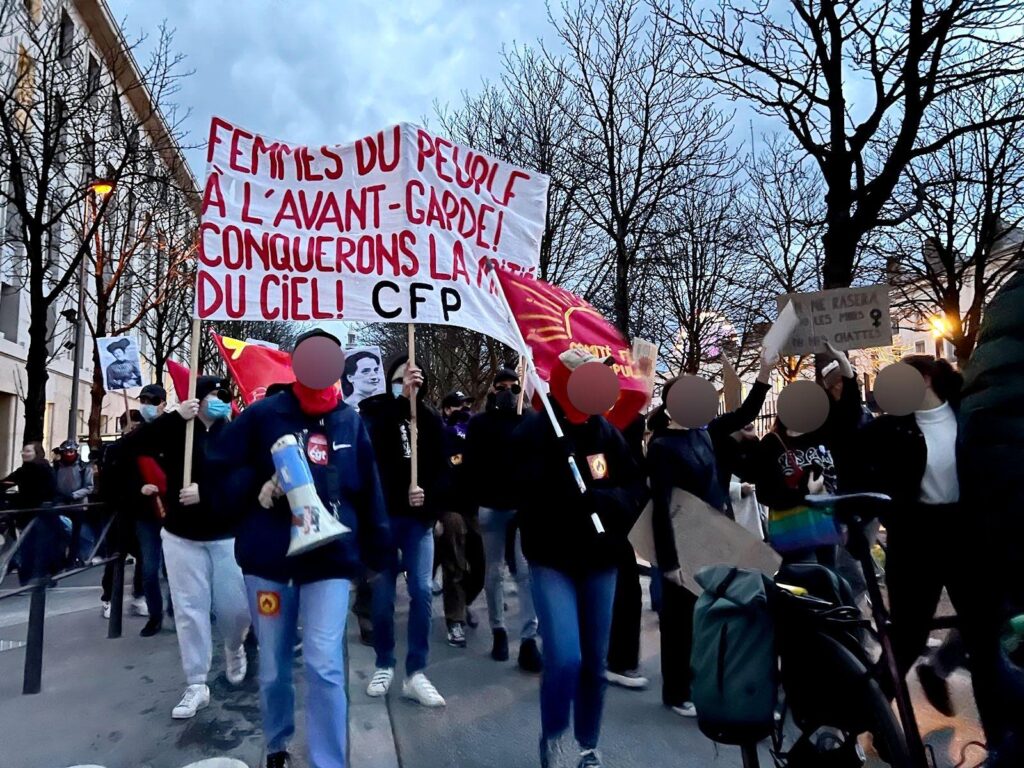
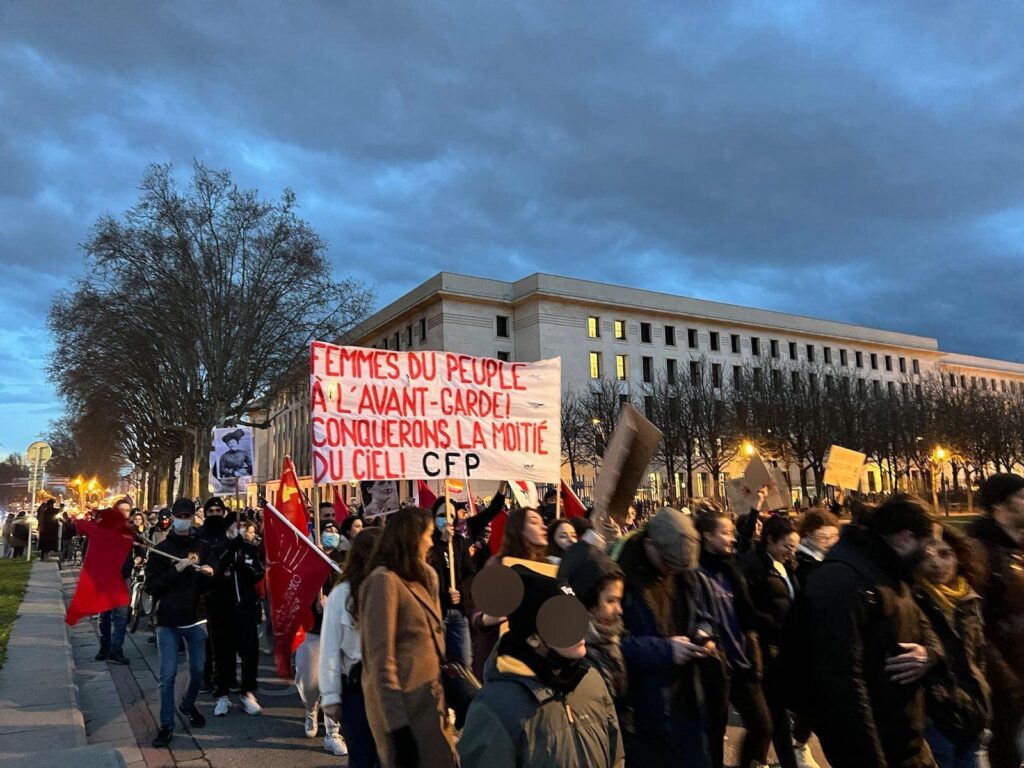
La Cause du Peuple (The People’s Cause) published several images of posters and grafiti actions.
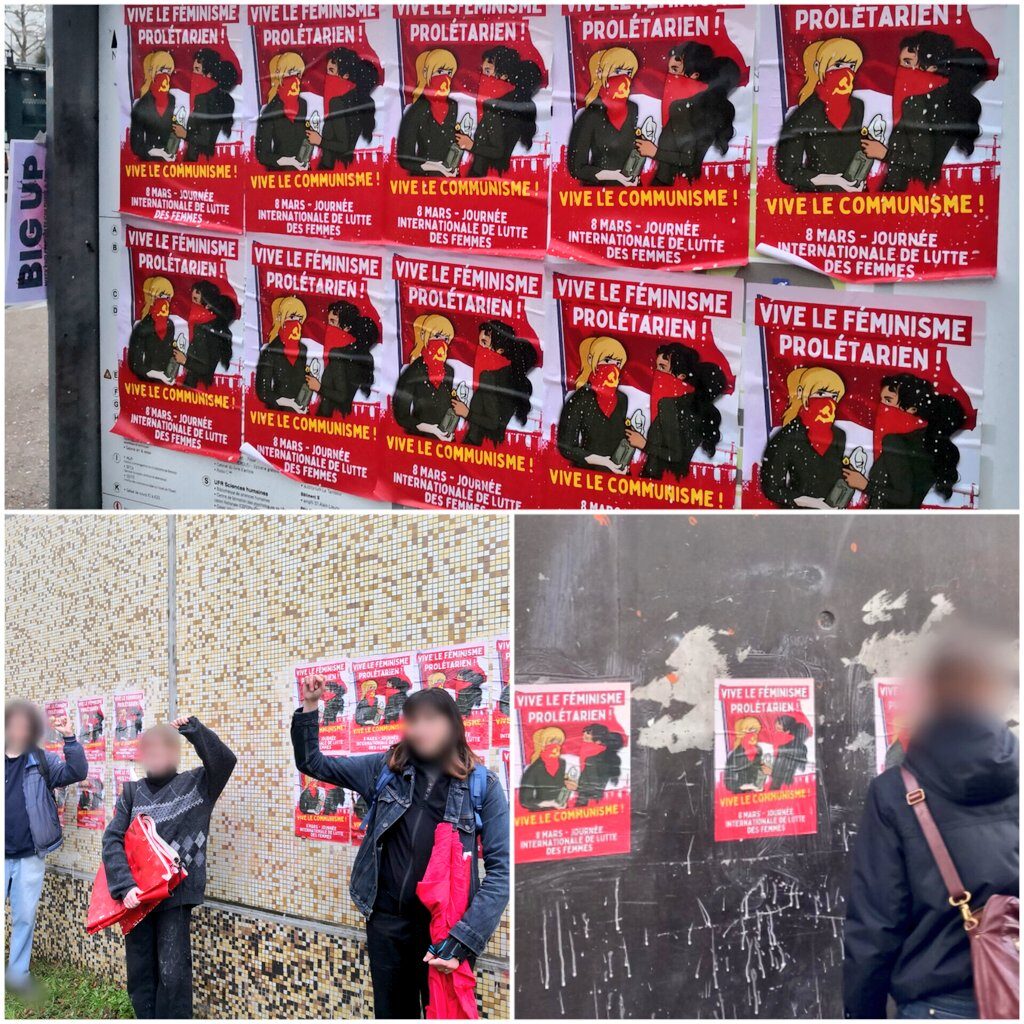
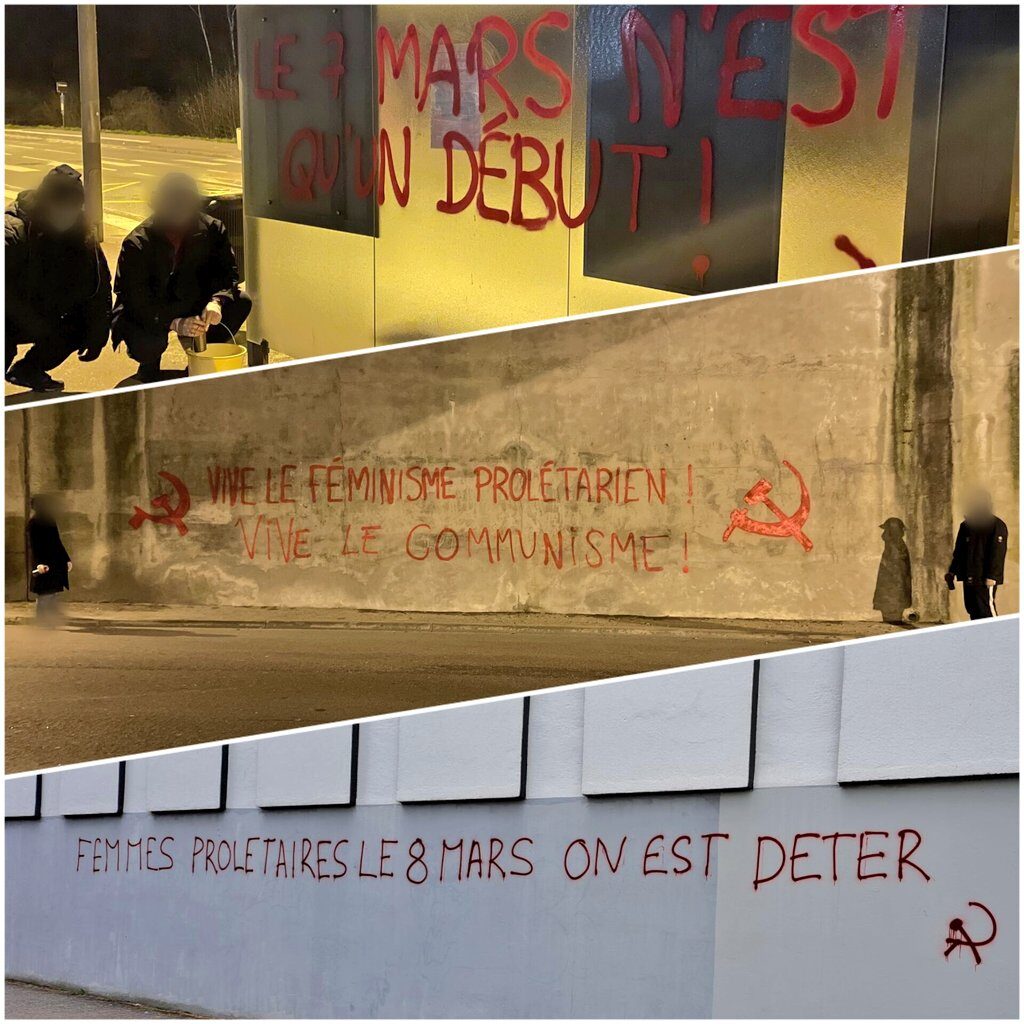
In Champigny a Banlieue of Paris, graffitti actions were done.
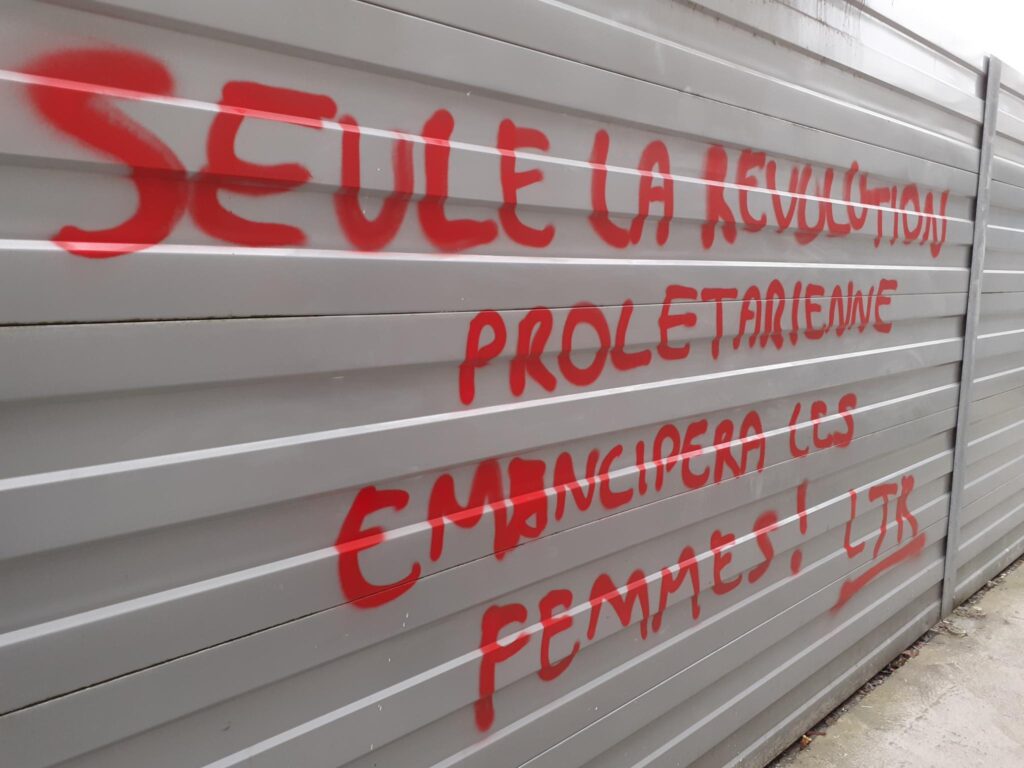
There were reports on actions in Paris, Limoges and Caen.
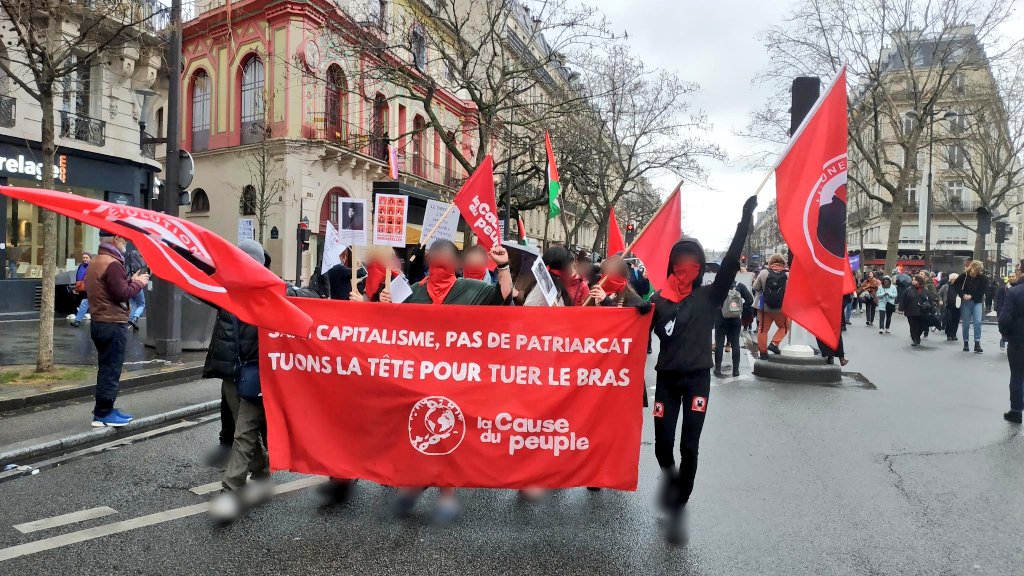
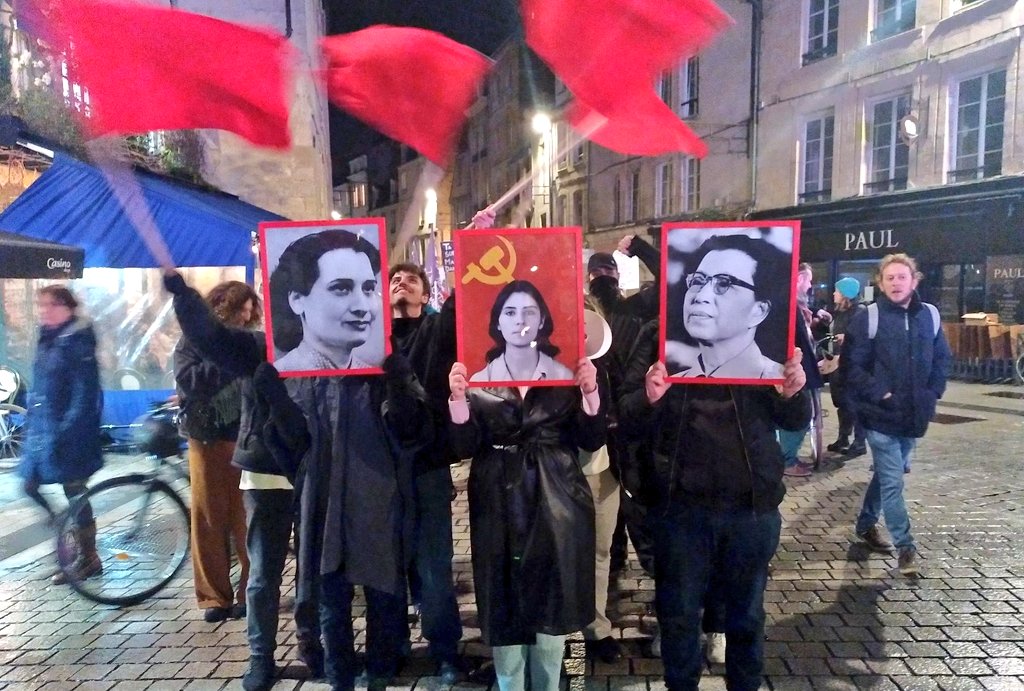
In Saint-Étienne posters were put up along the rally of the 7th of March national strike.
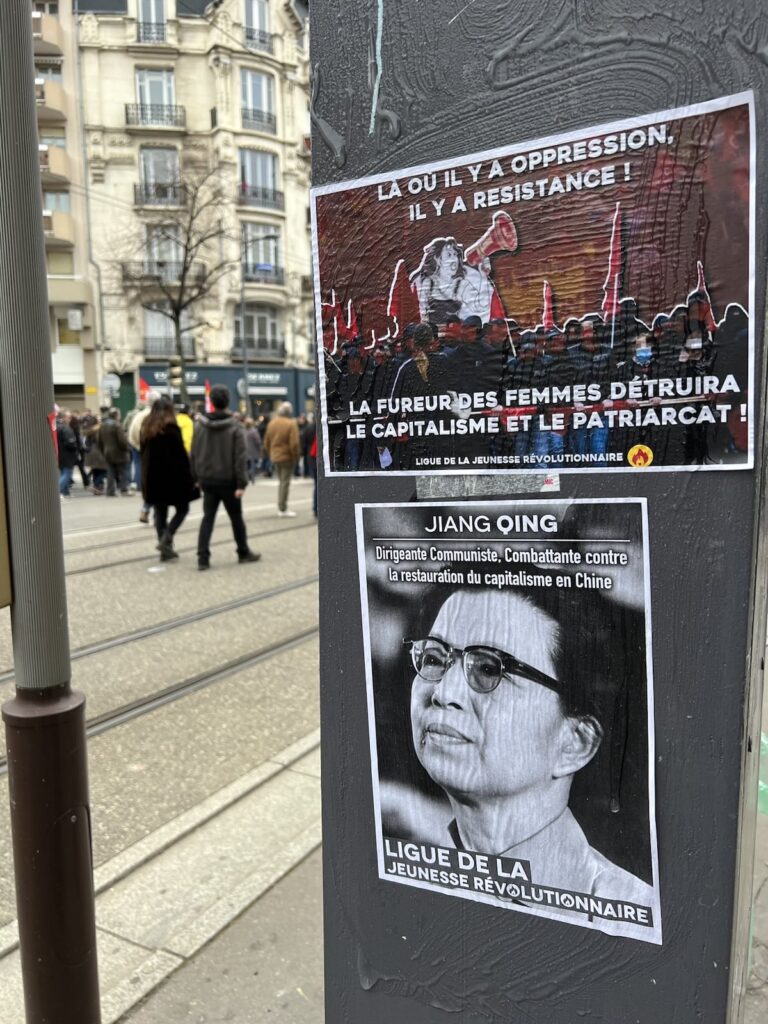
In Rennes comrades participated in a demonstration with an own bloc, as reported by Jeunes Révolutionnaires (Young Revolutionaries).
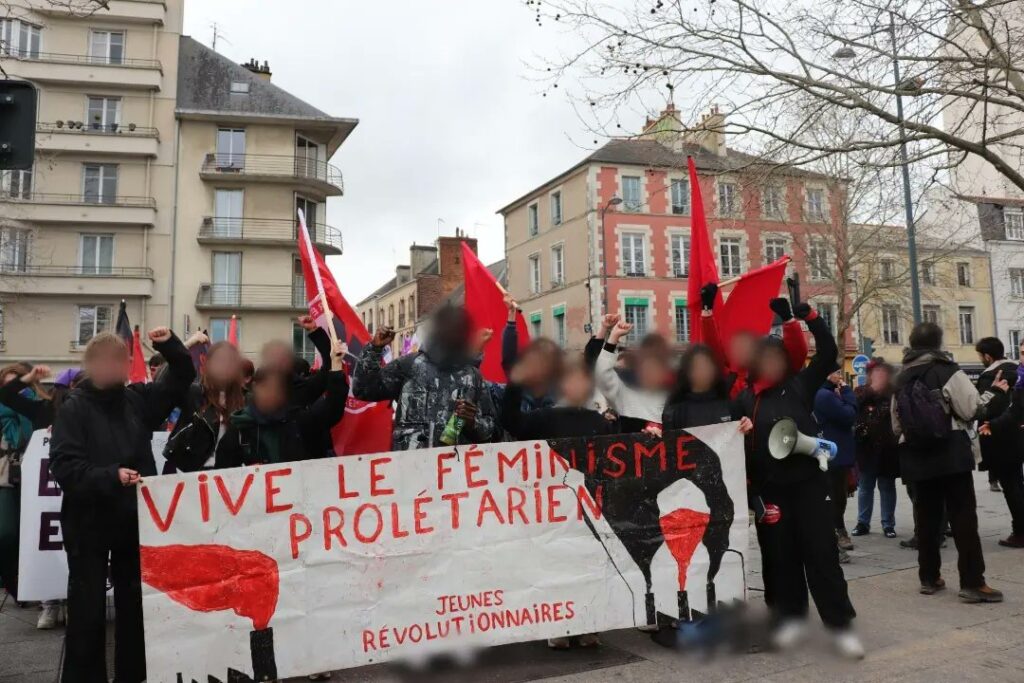
Germany
Dem Volke dienen (Serve the People) reported on different actions in Germany. Also a call of the Red Women’s Committee FRG was published.
In Hamburg, the largest demonstration was attended by several thousand participants. Here a contingent of the Red Women’s Committee Hamburg also took part in the first third of the demonstration, carrying a banner with the slogans: “Women combat and resist: Against imperialism and patriarchy! Against the inflation wave and militarism!”.
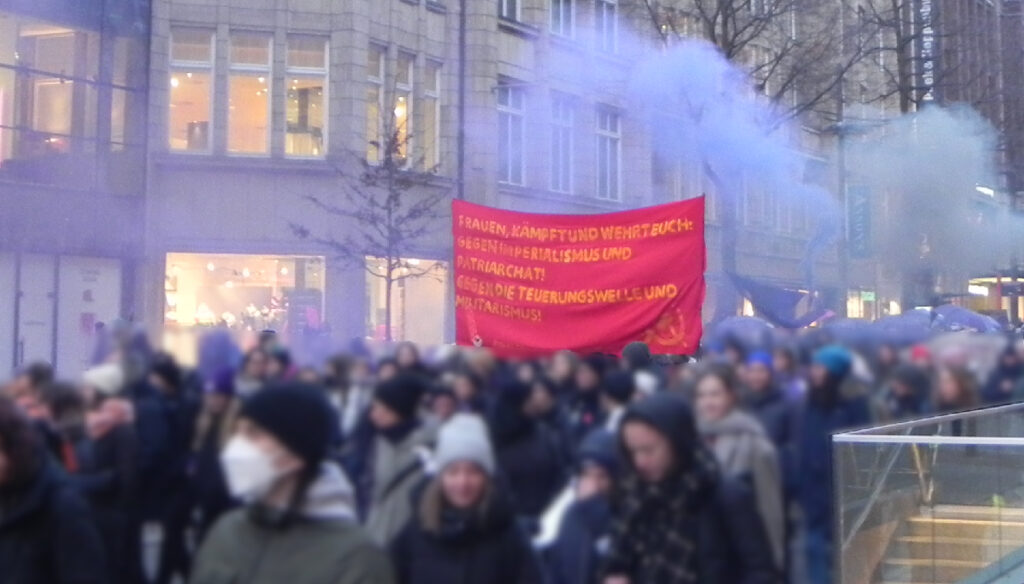
The Red Women’s Committee Bremen mobilized for a demonstration in Bremerhaven’s Goethe district under the slogan “Women combat and resist! Against the inflation wave and militarism!”. The militant rally opposed previous threats from the police. The slogans were enthusiastically received and shouted along by people from the neighborhood.
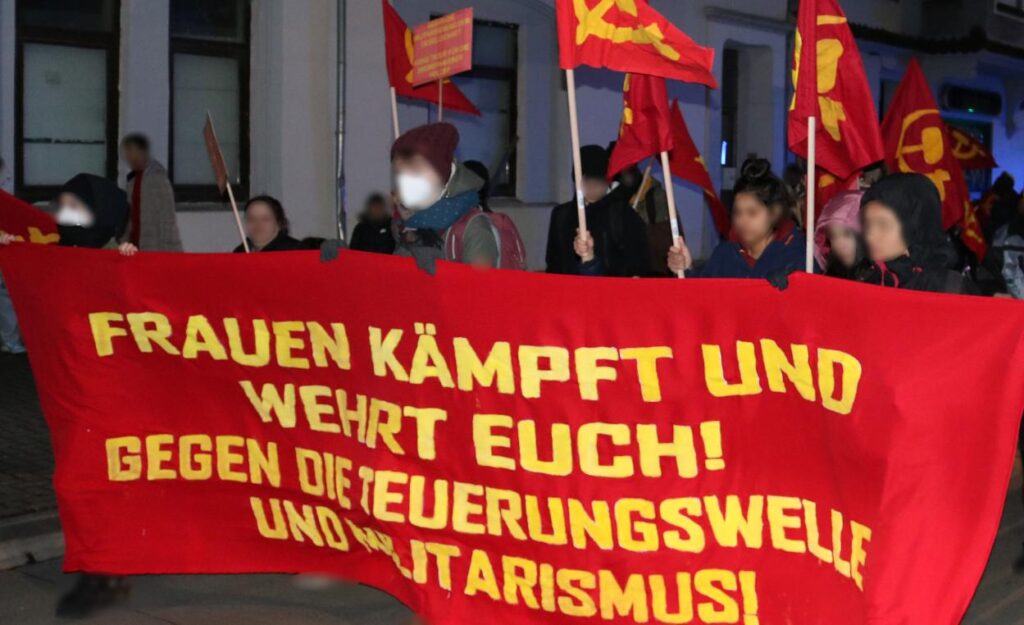
A contingent of proletarian revolutionaries participated in the anti-capitalist bloc of the large demonstration in Cologne. About 5000 people took part in the demonstration as a whole. Only after the demonstration was done the police dare to carry out further harassment against the participants, arresting one person.
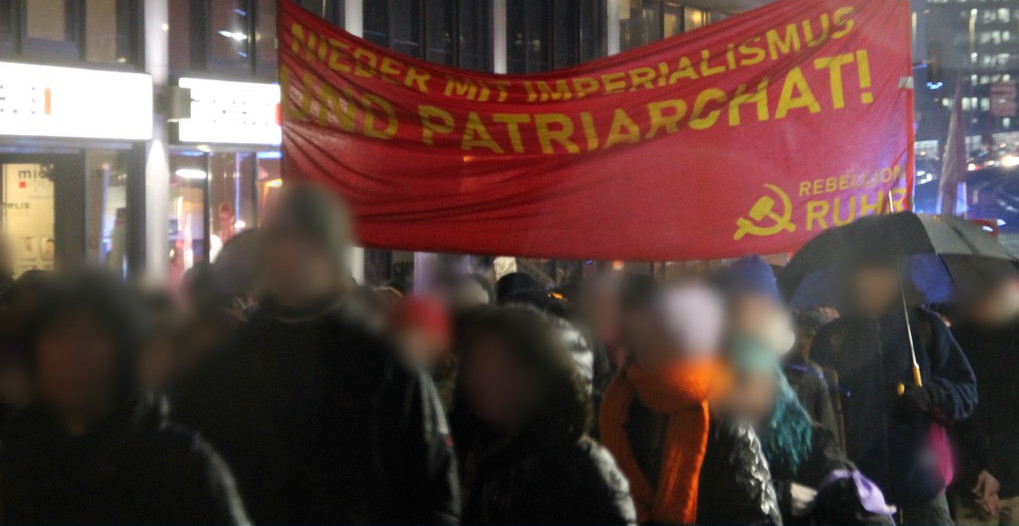
In Leipzig a demonstration with militant expression took place. There were about 50 participants. Among other things, slogans were shouted that upheld proletarian feminism, as well as anti-imperialist positions. The workers’ newspaper Rote Post (Red Post) was sold and leaflets with the call of the Red Women’s Committee were distributed.
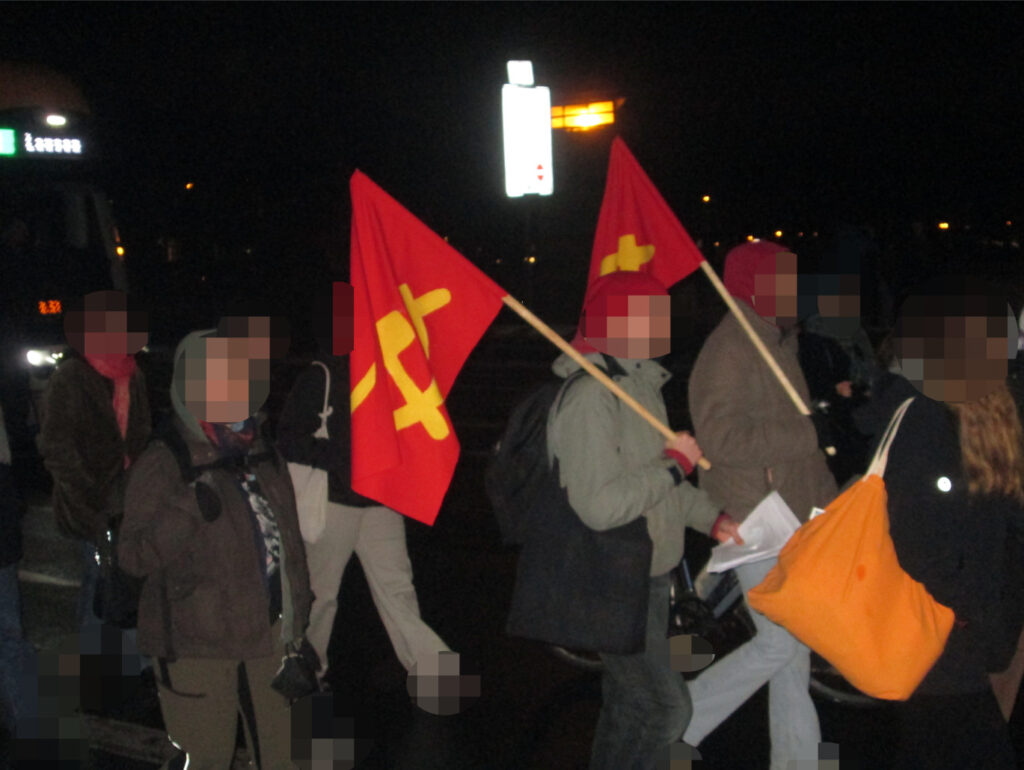
In Stuttgart and Ulm, Turkish Partizan and Purple Red Collective activists and readers participated in demonstrations, Yeni Demokrasi (New Democracy) reported.
A demonstration in Berlin was attended mainly by young women, but it was also well received by local residents, who joined in. Among other things, the workers’ newspaper “Red Post” was sold and the appeal of the Red Women’s Committee was distributed. This demonstration marched as a third block, under the name “Class struggle is feminist’s struggle”, into a later large demonstration. It is estimated that more than 5000 people participated. At the final point, the police attacked the final rally and arrested one person.
In Frankfurt and Nuremberg Turkish Partizan and Purple Red Collective activists participated in the demonstrations with their banners, as Yeni Demokrasi (New Democracy) reported. In addition to the leaflet issued by the Purple Red Collective in German, the latest issue of Yeni Demokrasi newspaper was also distributed.
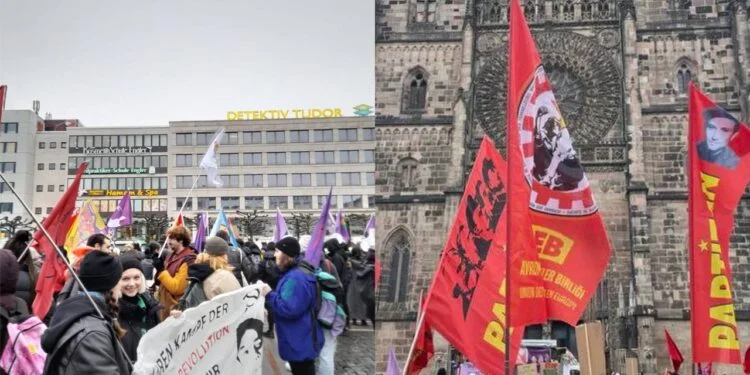
Mexico
The People’s Women’s Movement published a manifesto for the 8th of March. It stated among other things: “For the women of the people, the struggle for women’s emancipation is intrinsically linked to the defense of territory, water, life, health, labor rights, children, etc., as well as to the struggle for national liberation, for the New Democracy and Socialism that Mexico demands in order to put an end to the exploitation of humanity.”
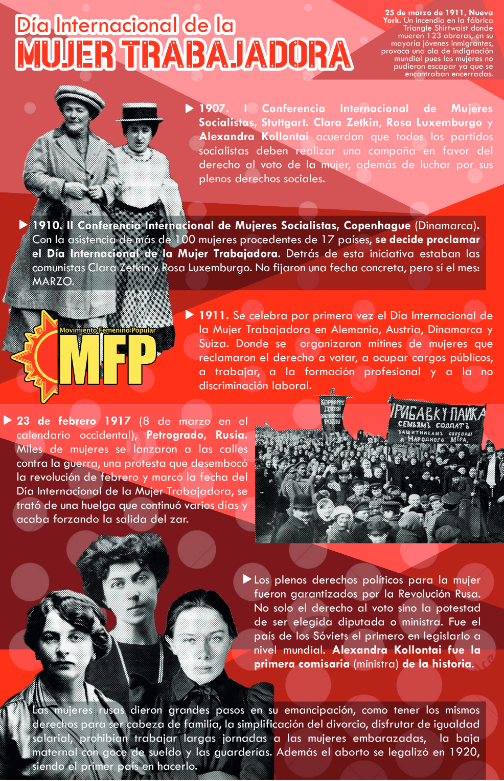
Sol Rojo Mx (Red Sun Mexico) reported on clashes between women’s contingents and repressive forces in Mexico.
Norway
The Struggle Committee in Oslo, together with several other organizations, called for a demonstration. From the very first moment, there was a combative atmosphere among the participants. After a march they joined the March 8 Committee’s demonstration and a joint block was formed. Many new participants joined. The slogans resounded strongly through the streets of Oslo. Especially one slogan was shouted with full throat and conviction: “Wave by wave – blow by blow – against imperialism and patriarchy!”
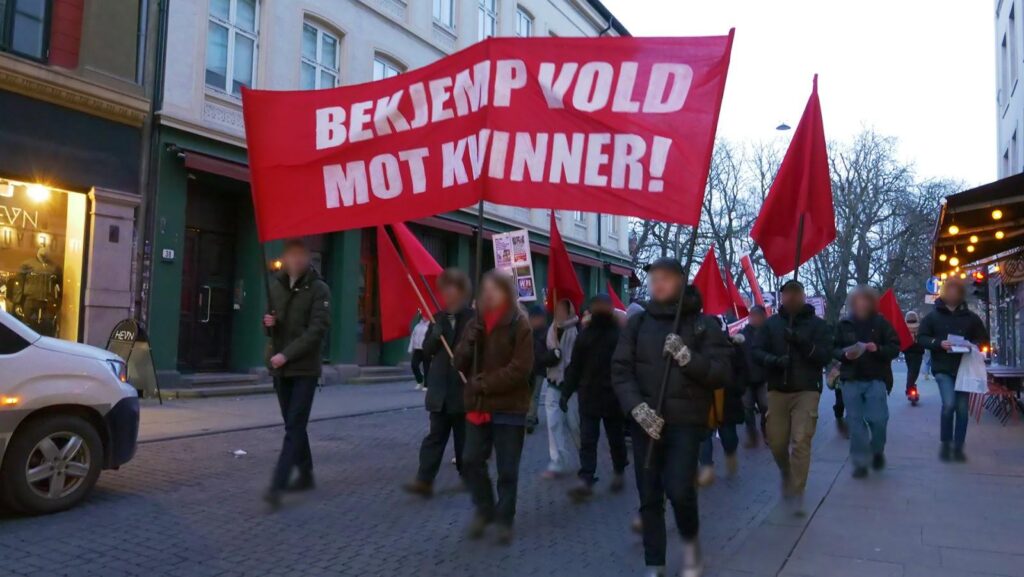
The Kampkomiteen (Struggle Committee) reported on a march in Bergen under the slogan “Fight violence against women!”. The same evening, a meeting in support of Israel took place. Activists from the Struggle Committee, activists and Palestinians opposed it, shouting slogans and waving Palestinian flags.
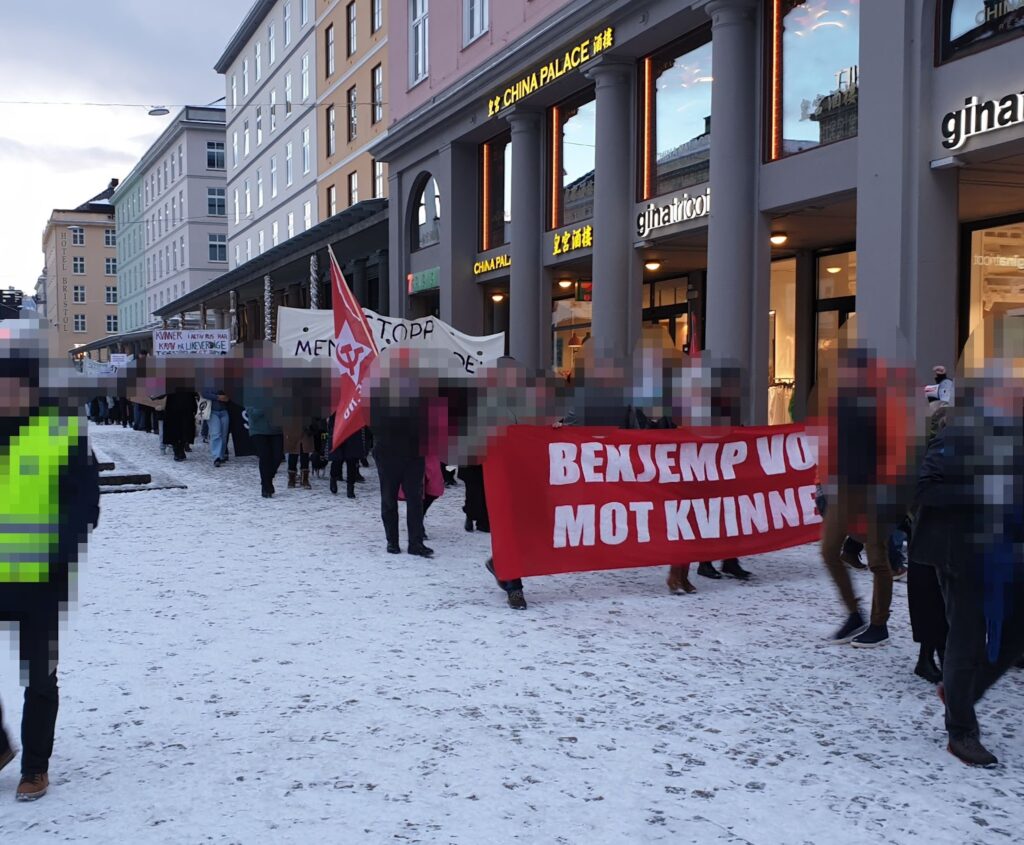
In Trondheim, activists from the Struggle Committee organized a demonstration. This march was held under the slogan “Out on the streets on March 8 – for a class line in the women’s movement!” After the march, the activists participated in the rally and the March 8 procession in Trondheim, under the slogan “Fight violence against women!”
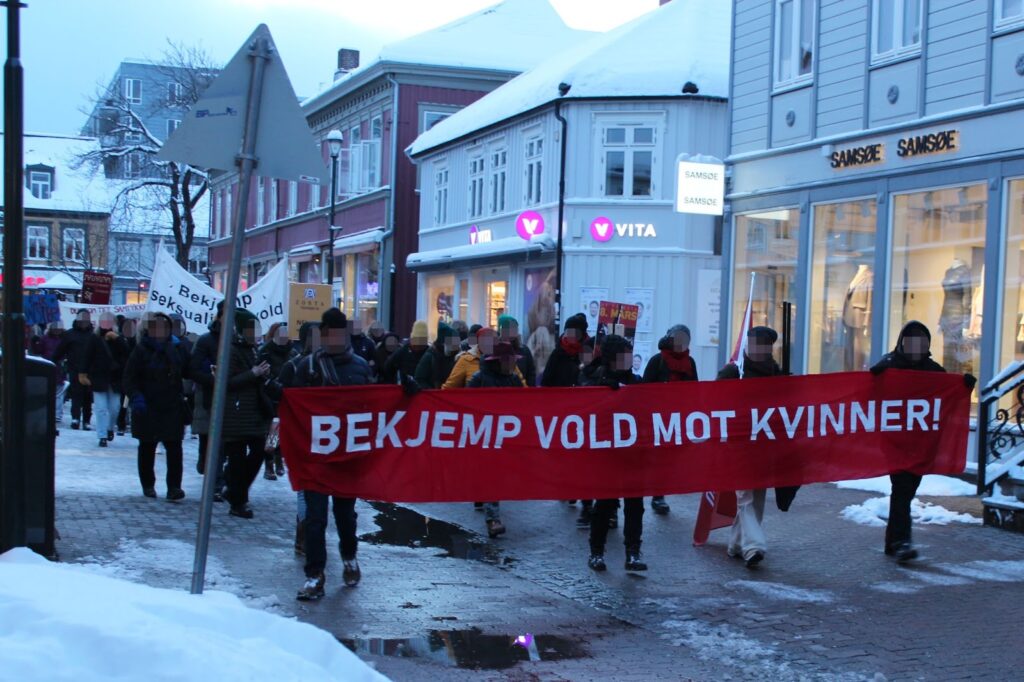
The Struggle Committee participated in the March 8 march in Kristiansand with the banner “Fight violence against women”. The Committee has also participated after the rally at an event focusing on international solidarity, with panel discussions, appeals and Palestinian dance, and at a concert with Sliteneliten.
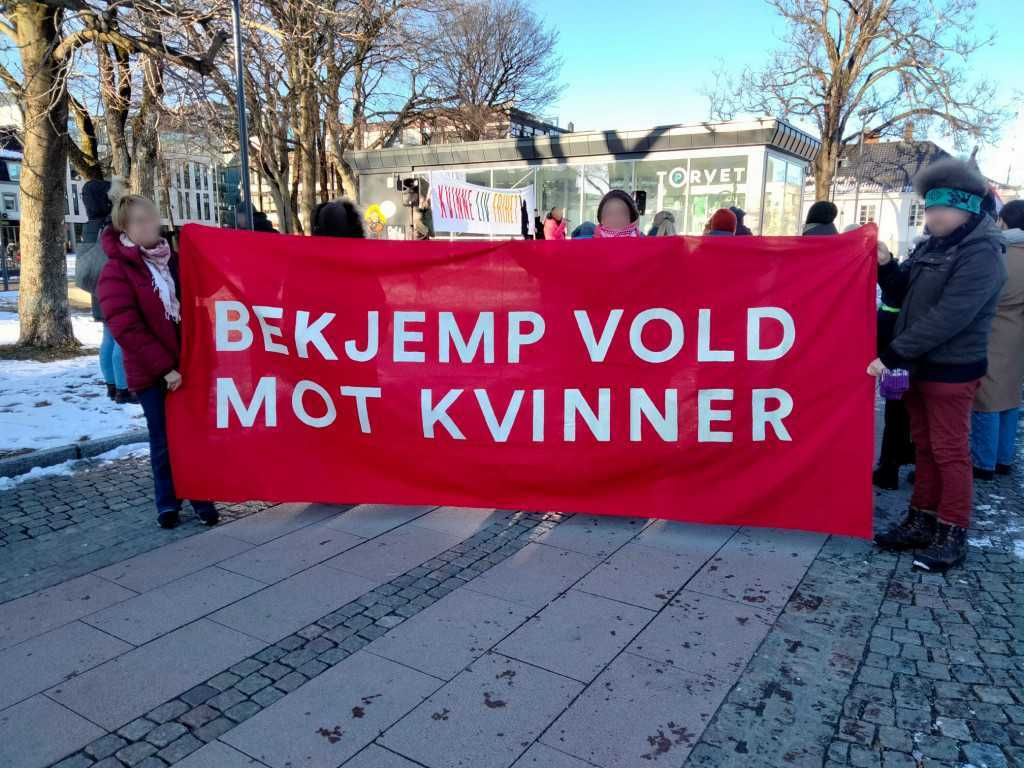
Spain
Activists and friends of the newspaper Servir al Pueblo (Serve the People) in Madrid have carried out propaganda activities in relation to the International Working Women’s Day in universities of the city, Universidad Complutense, several faculties of the UCM and Universidad Autónoma de Madrid.
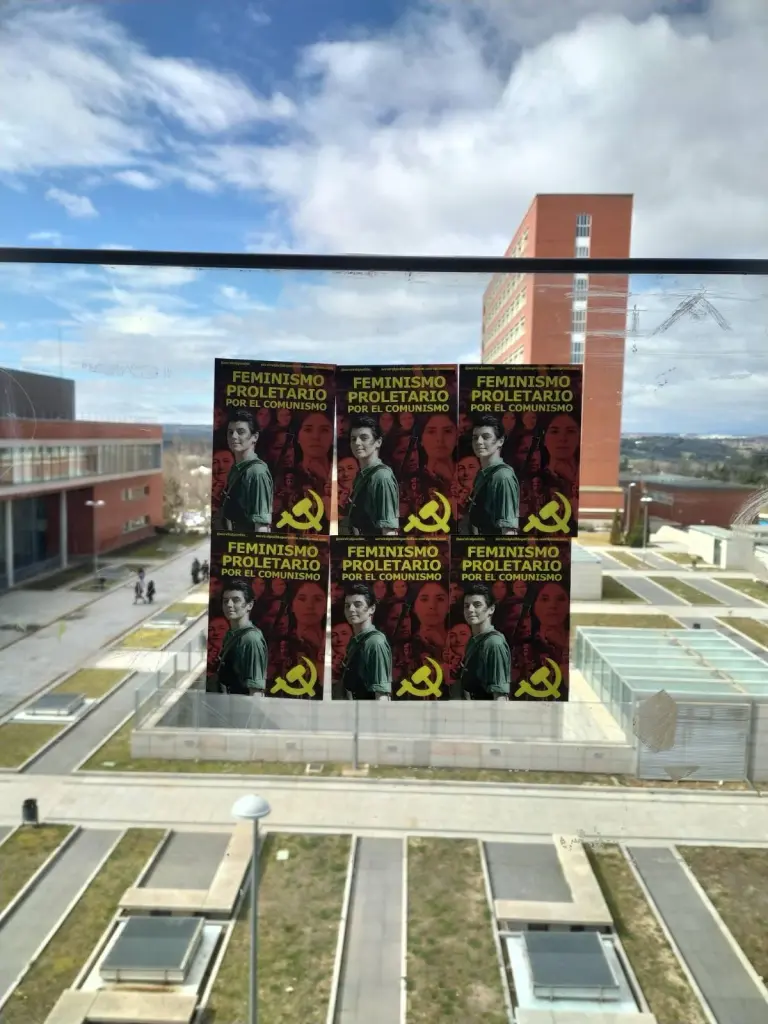
Revolutionary activists of Valencia have carried out different actions at the university of Blasco Ibáñez, three banners drops, graffitti and stickers all over the neighborhood.
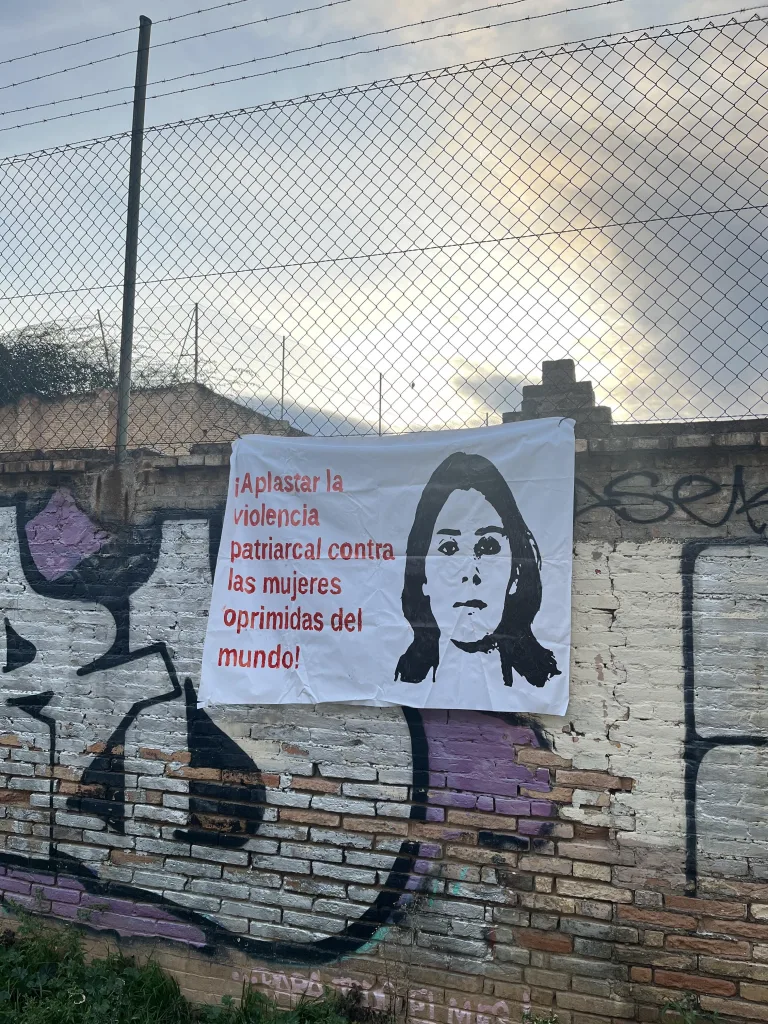
In Albacete migrant and working women marched under banners of the International Communist League and Comrade Norah. The revolutionaries and the masses of the city of Albacete have once again dyed red on Working Women’s Day after weeks of work that culminated in the celebration of the mobilization of March 8, in which the Revolutionary Committee of Albacete called together with the Association of African Women a block of Women Workers against Imperialism. Throughout the last weeks there have been several leaflets in faculties and institutes, with a communiqué calling for the independent organization of the female masses for their liberation, in the face of the lies and instrumentalization of the bourgeois state. Propaganda was also made about the actions and the importance of the struggle of the women workers in the settlement of seasonal workers on the Las Peñas road. Graffiti, posters, stickers and banners appeared in various parts of the city, especially in the proletarian neighborhoods where the migrant population is concentrated in a very significant way. Days before the call, in a joint day, the African Women of Albacete and the Revolutionary Committee of Albacete prepared the banners and posters – in Spanish and Wolof – which were taken to the mobilization. A large banner gave name to the block, which read “Women workers against imperialism”. Women and children participated in this activity. After this preparatory work African women and revolutionaries of the city marched behind their banner, under the flags of the International Communist League. On the banners could be read slogans like “Long live the struggle of migrant women” or “Proletarian women for communism”. Next to the flags of the proletariat a portrait of comrade Nora could be seen, which was carried along the entire route of the mobilization. Megaphone in hand, the African women denounced the difficulties they have. This mobilization was not exempt from police presence, with police infiltrators who did not hesitate to identify several members of the bloc, as they have already done in the mobilizations called by the revolutionaries. Despite their attempts to intimidate the organized movement, the bloc chanted in unison “here we see the strength of the Committee”. This is a force born of the masses, and which knows that it faces a State that does not hesitate to try to repress and suffocate it.
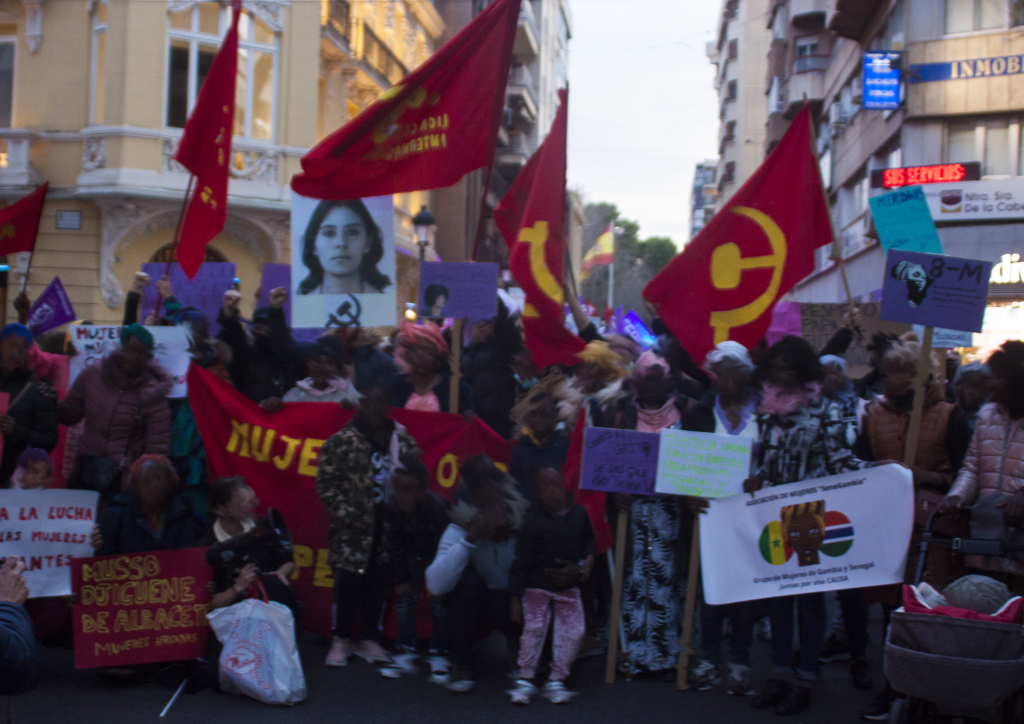
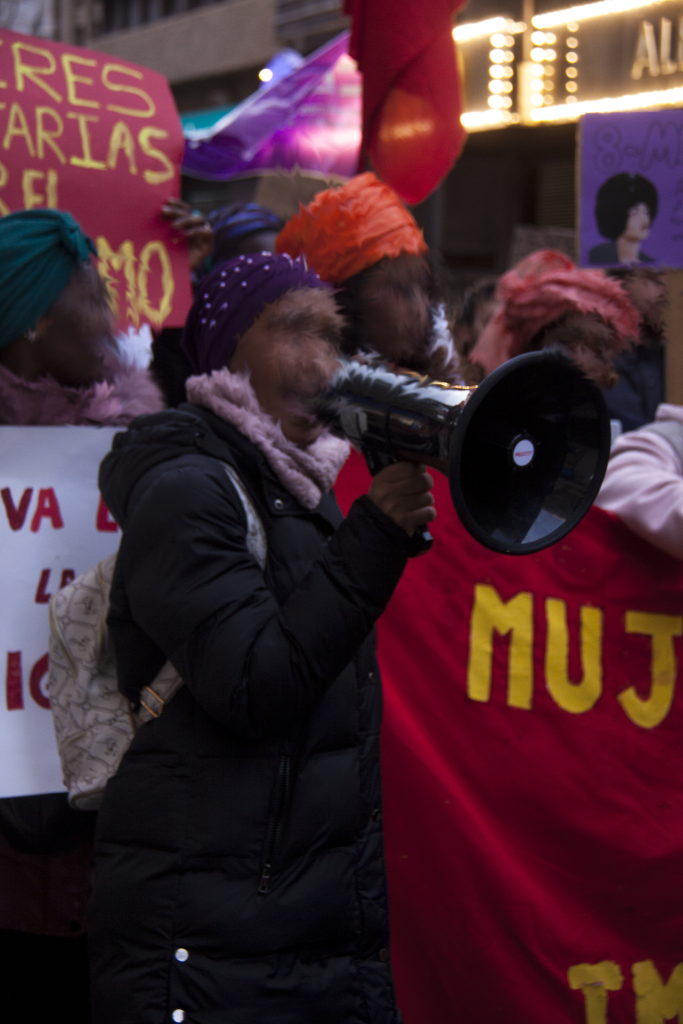
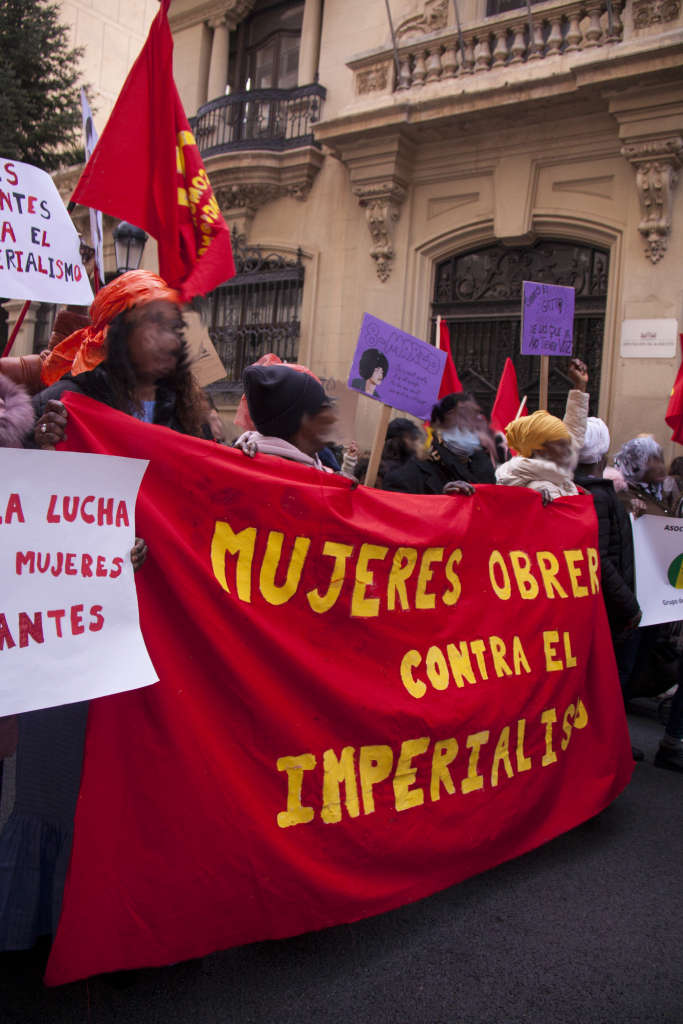
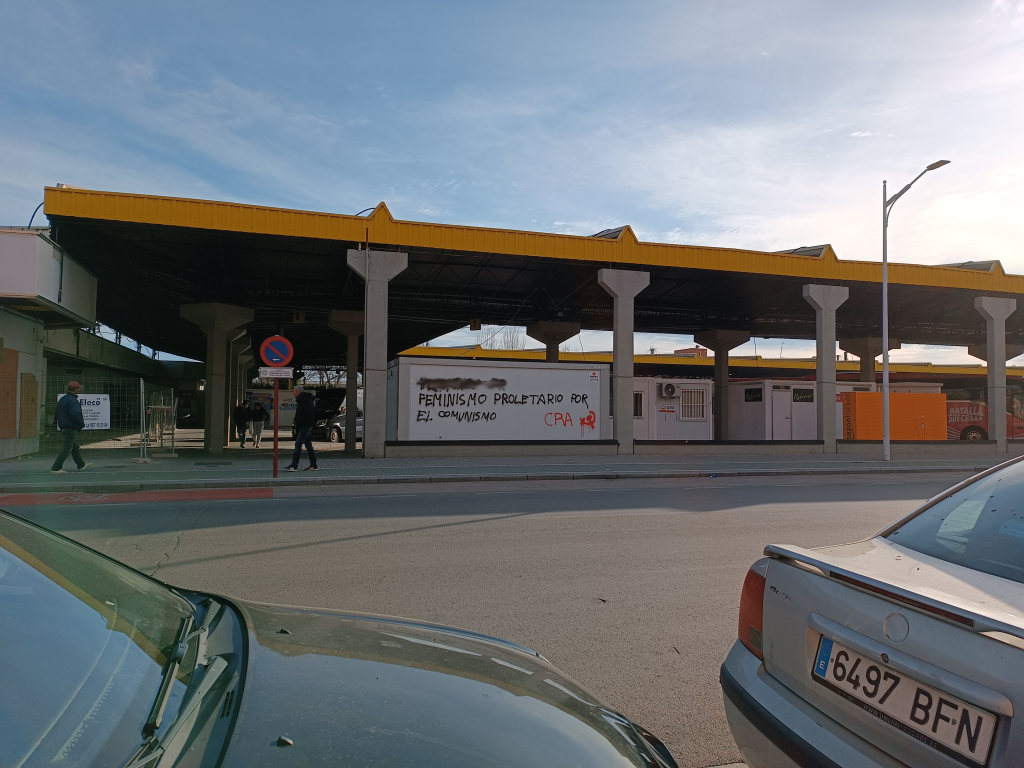
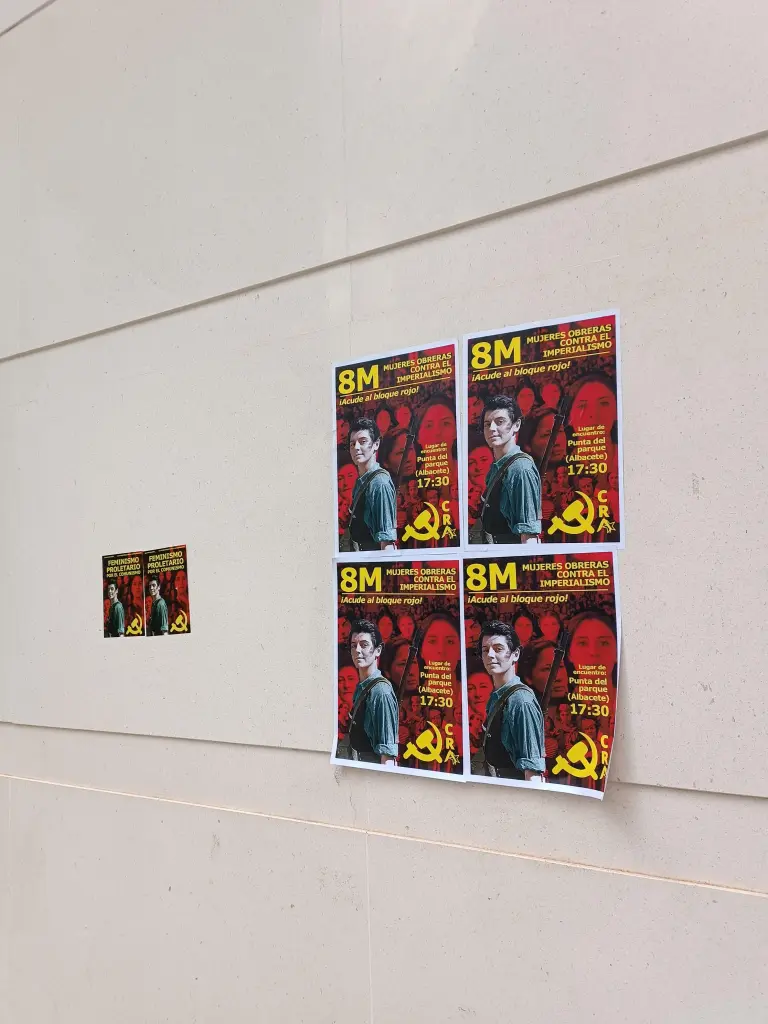
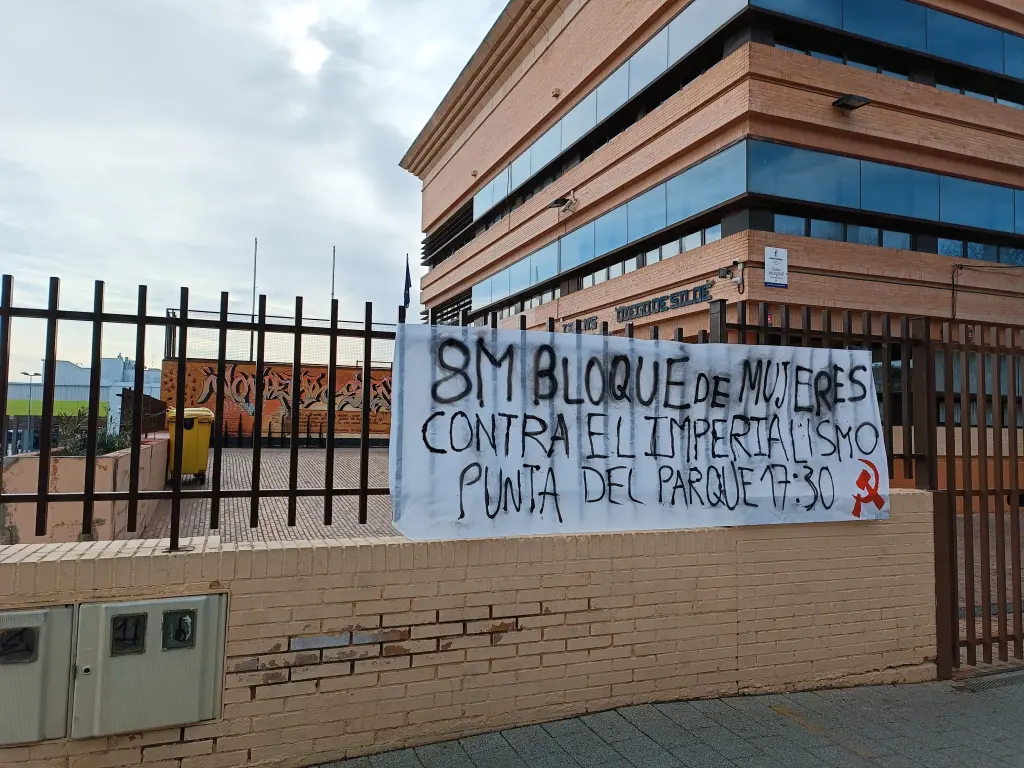
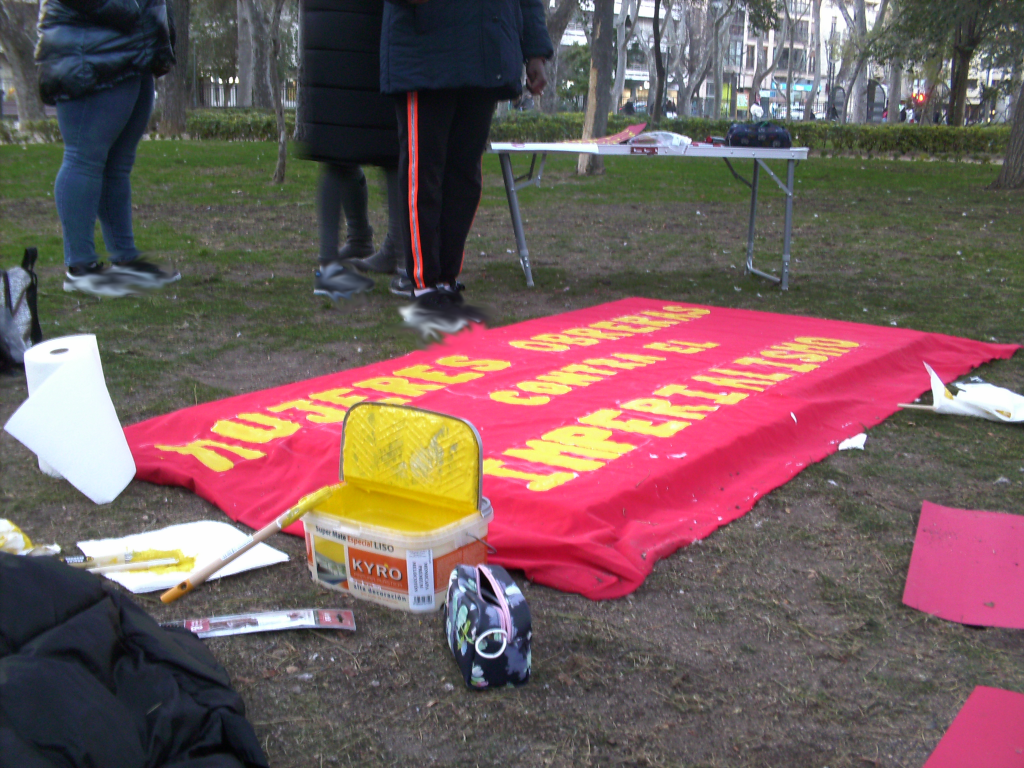
Sweden
In the capital Stockholm comrades marched under the slogan “For a class-line in the Women’s Movement”.
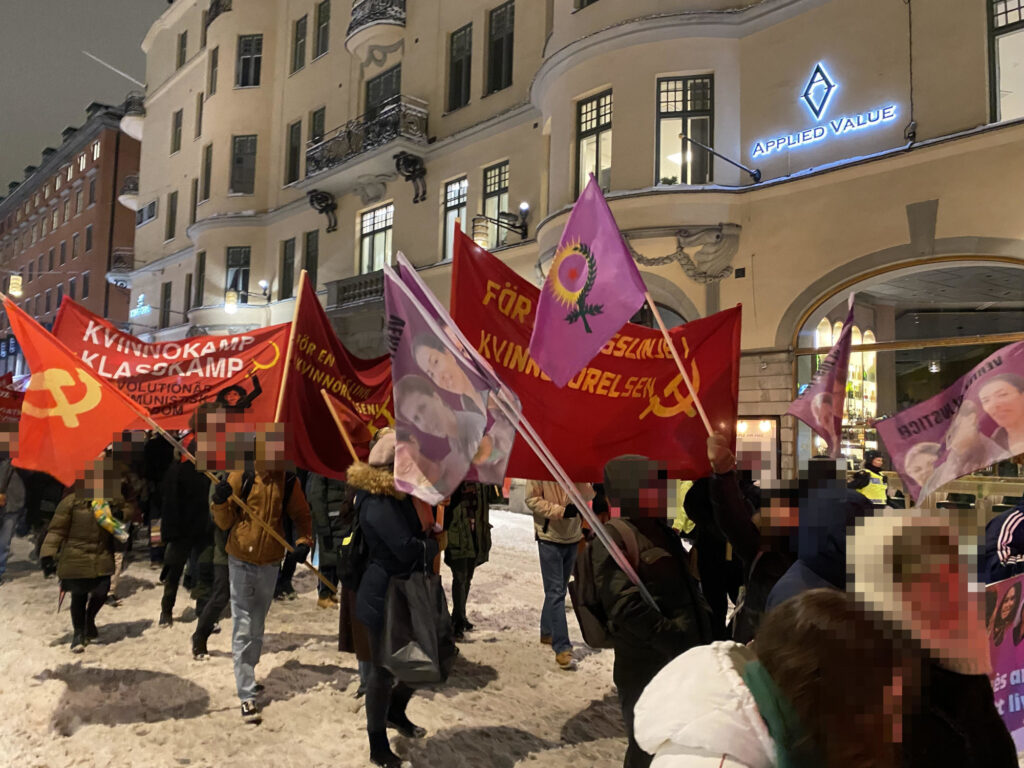
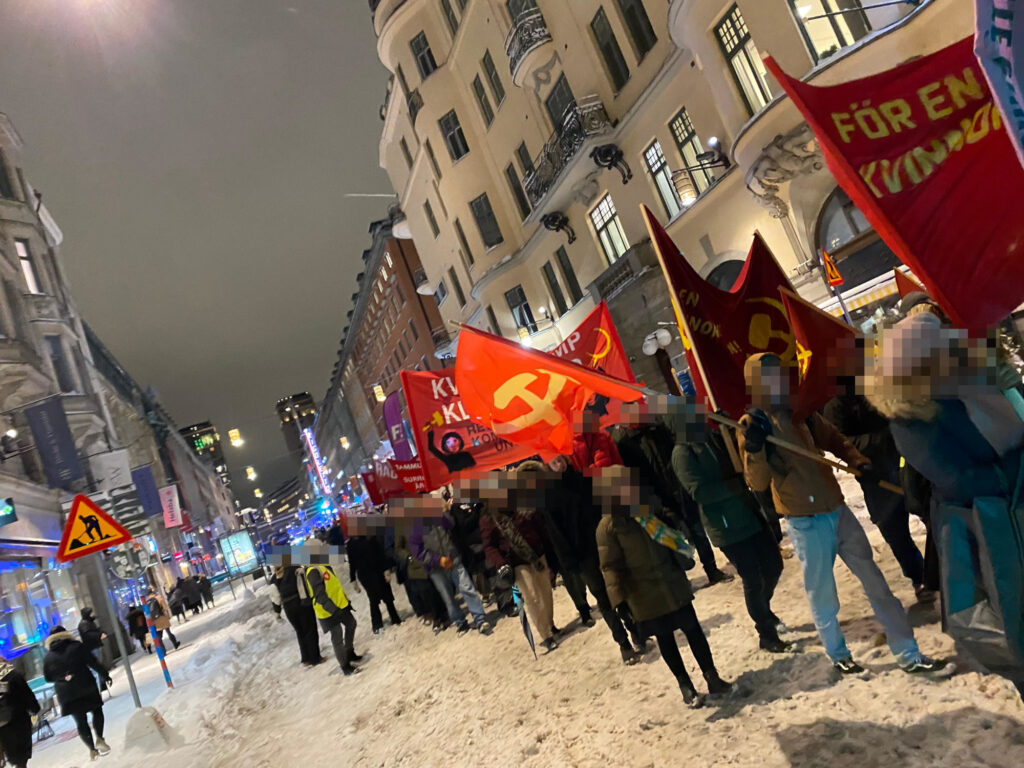
Turkey
In Maras, New Democratic Women (YDK) and Munzur Environment Association (MÇD) came together with women from villages in Elbistan. The peasant women talked about the difficulties of life in the villages and stated that life had become more difficult after the earthquake. They said that it was difficult to cook, bathe and take care of children in a disorganized life. In the speech made by the YDK representative, it was stated that women and children, who already lacked life safety, had no life safety in the tent cities and that precautions could not be taken.
